Coventry University, M015LON: Training Workshop Project and Evaluation
VerifiedAdded on 2021/02/15
|10
|2333
|44
Project
AI Summary
This assignment, part of the Developing People module (M015LON) at Coventry University, centers on a comprehensive training workshop project. Students are tasked with designing, delivering, and evaluating a training program, encompassing a full understanding of the training cycle. The project includes three key stages: delivering a full training workshop, submitting detailed documentation (including a script, project plan, team job descriptions, and meeting minutes), and presenting an individual critical evaluation via a podcast and supporting written document. The assessment emphasizes the application of training theories, needs analysis, design, and evaluation methods. The module aims to provide a grounding in the strategic management and development of people in organizations, considering individual, team, and organizational perspectives, as well as the challenges of globalization. Students are expected to assess organizational strategy influence, evaluate training models, analyze training needs, and develop skills to partner with line managers. This assignment provides an opportunity to apply theoretical knowledge to practical scenarios, developing key professional skills for effective employee development.
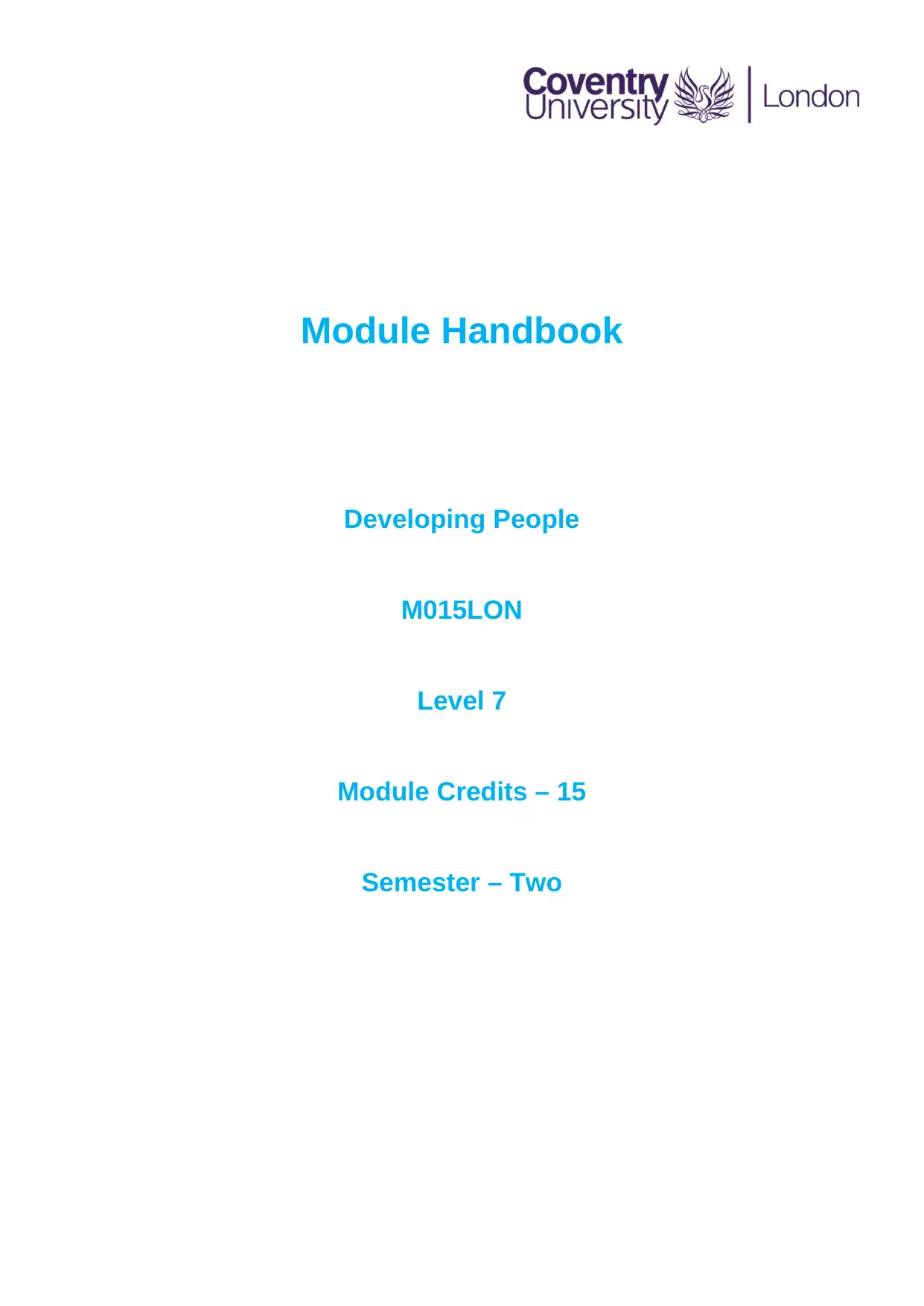
Module Handbook
Developing People
M015LON
Level 7
Module Credits – 15
Semester – Two
Developing People
M015LON
Level 7
Module Credits – 15
Semester – Two
Paraphrase This Document
Need a fresh take? Get an instant paraphrase of this document with our AI Paraphraser
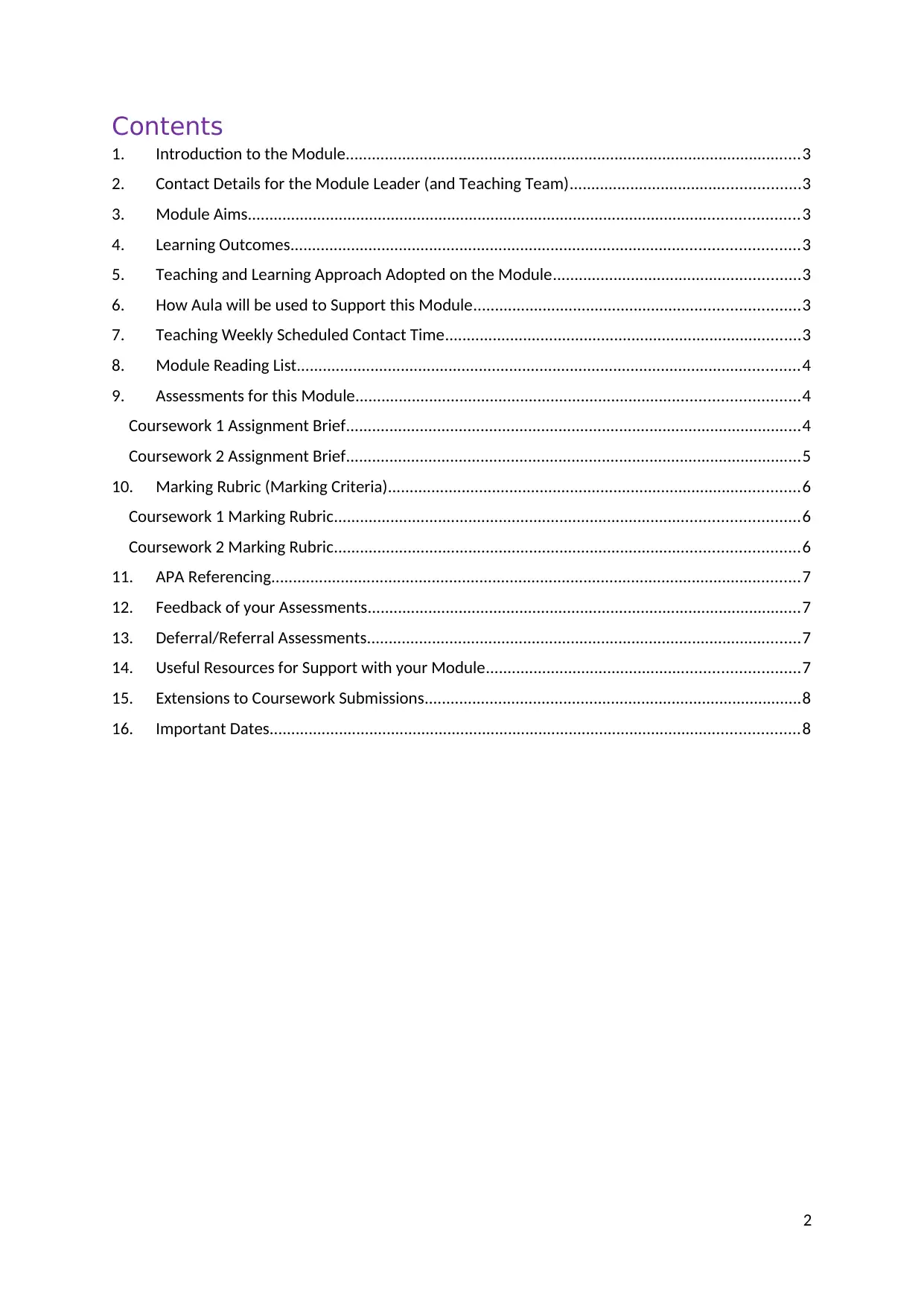
Contents
1. Introduction to the Module.........................................................................................................3
2. Contact Details for the Module Leader (and Teaching Team).....................................................3
3. Module Aims...............................................................................................................................3
4. Learning Outcomes.....................................................................................................................3
5. Teaching and Learning Approach Adopted on the Module.........................................................3
6. How Aula will be used to Support this Module...........................................................................3
7. Teaching Weekly Scheduled Contact Time..................................................................................3
8. Module Reading List....................................................................................................................4
9. Assessments for this Module......................................................................................................4
Coursework 1 Assignment Brief.........................................................................................................4
Coursework 2 Assignment Brief.........................................................................................................5
10. Marking Rubric (Marking Criteria)...............................................................................................6
Coursework 1 Marking Rubric...........................................................................................................6
Coursework 2 Marking Rubric...........................................................................................................6
11. APA Referencing..........................................................................................................................7
12. Feedback of your Assessments....................................................................................................7
13. Deferral/Referral Assessments....................................................................................................7
14. Useful Resources for Support with your Module........................................................................7
15. Extensions to Coursework Submissions.......................................................................................8
16. Important Dates..........................................................................................................................8
2
1. Introduction to the Module.........................................................................................................3
2. Contact Details for the Module Leader (and Teaching Team).....................................................3
3. Module Aims...............................................................................................................................3
4. Learning Outcomes.....................................................................................................................3
5. Teaching and Learning Approach Adopted on the Module.........................................................3
6. How Aula will be used to Support this Module...........................................................................3
7. Teaching Weekly Scheduled Contact Time..................................................................................3
8. Module Reading List....................................................................................................................4
9. Assessments for this Module......................................................................................................4
Coursework 1 Assignment Brief.........................................................................................................4
Coursework 2 Assignment Brief.........................................................................................................5
10. Marking Rubric (Marking Criteria)...............................................................................................6
Coursework 1 Marking Rubric...........................................................................................................6
Coursework 2 Marking Rubric...........................................................................................................6
11. APA Referencing..........................................................................................................................7
12. Feedback of your Assessments....................................................................................................7
13. Deferral/Referral Assessments....................................................................................................7
14. Useful Resources for Support with your Module........................................................................7
15. Extensions to Coursework Submissions.......................................................................................8
16. Important Dates..........................................................................................................................8
2
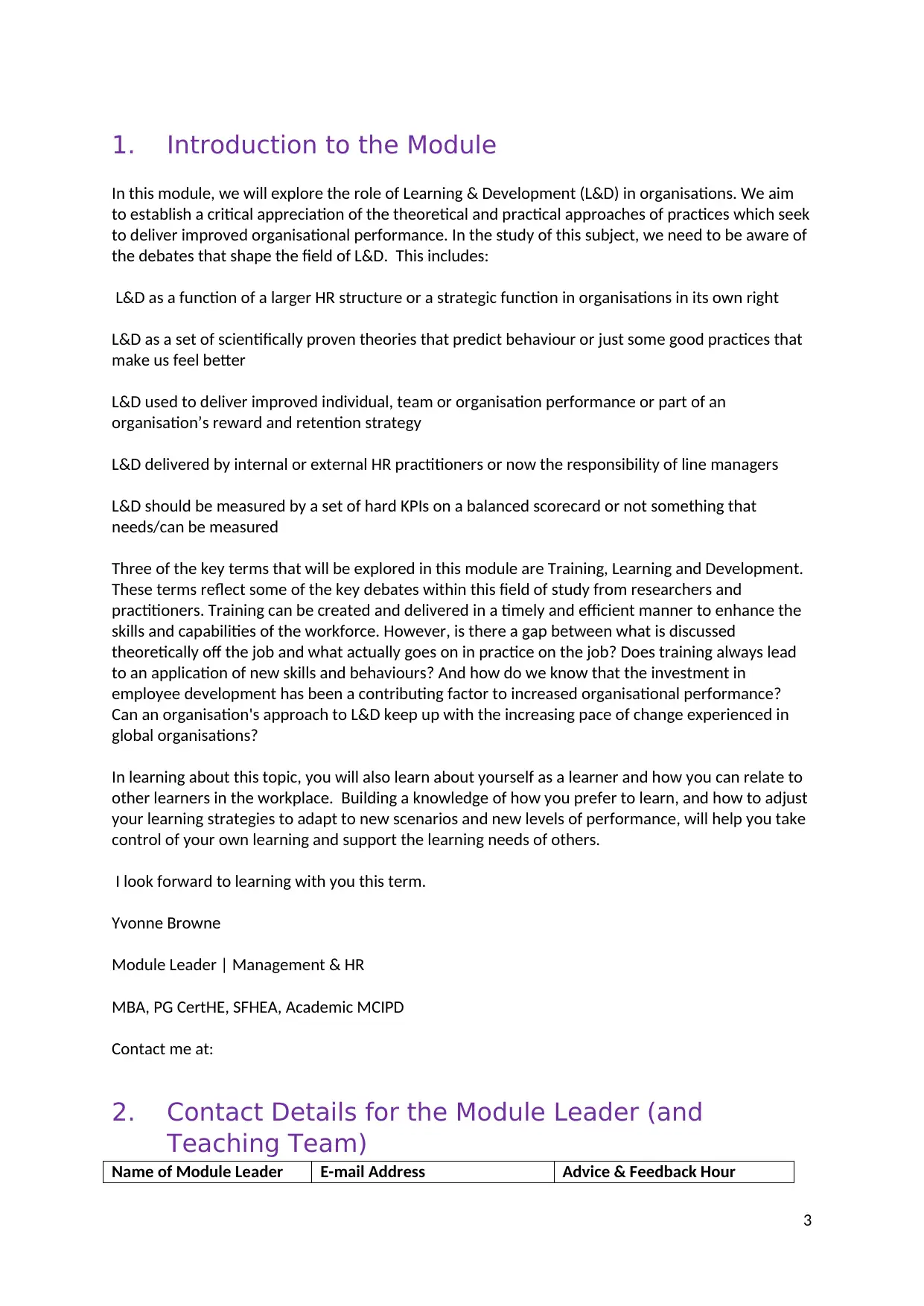
1. Introduction to the Module
In this module, we will explore the role of Learning & Development (L&D) in organisations. We aim
to establish a critical appreciation of the theoretical and practical approaches of practices which seek
to deliver improved organisational performance. In the study of this subject, we need to be aware of
the debates that shape the field of L&D. This includes:
L&D as a function of a larger HR structure or a strategic function in organisations in its own right
L&D as a set of scientifically proven theories that predict behaviour or just some good practices that
make us feel better
L&D used to deliver improved individual, team or organisation performance or part of an
organisation’s reward and retention strategy
L&D delivered by internal or external HR practitioners or now the responsibility of line managers
L&D should be measured by a set of hard KPIs on a balanced scorecard or not something that
needs/can be measured
Three of the key terms that will be explored in this module are Training, Learning and Development.
These terms reflect some of the key debates within this field of study from researchers and
practitioners. Training can be created and delivered in a timely and efficient manner to enhance the
skills and capabilities of the workforce. However, is there a gap between what is discussed
theoretically off the job and what actually goes on in practice on the job? Does training always lead
to an application of new skills and behaviours? And how do we know that the investment in
employee development has been a contributing factor to increased organisational performance?
Can an organisation's approach to L&D keep up with the increasing pace of change experienced in
global organisations?
In learning about this topic, you will also learn about yourself as a learner and how you can relate to
other learners in the workplace. Building a knowledge of how you prefer to learn, and how to adjust
your learning strategies to adapt to new scenarios and new levels of performance, will help you take
control of your own learning and support the learning needs of others.
I look forward to learning with you this term.
Yvonne Browne
Module Leader | Management & HR
MBA, PG CertHE, SFHEA, Academic MCIPD
Contact me at:
2. Contact Details for the Module Leader (and
Teaching Team)
Name of Module Leader E-mail Address Advice & Feedback Hour
3
In this module, we will explore the role of Learning & Development (L&D) in organisations. We aim
to establish a critical appreciation of the theoretical and practical approaches of practices which seek
to deliver improved organisational performance. In the study of this subject, we need to be aware of
the debates that shape the field of L&D. This includes:
L&D as a function of a larger HR structure or a strategic function in organisations in its own right
L&D as a set of scientifically proven theories that predict behaviour or just some good practices that
make us feel better
L&D used to deliver improved individual, team or organisation performance or part of an
organisation’s reward and retention strategy
L&D delivered by internal or external HR practitioners or now the responsibility of line managers
L&D should be measured by a set of hard KPIs on a balanced scorecard or not something that
needs/can be measured
Three of the key terms that will be explored in this module are Training, Learning and Development.
These terms reflect some of the key debates within this field of study from researchers and
practitioners. Training can be created and delivered in a timely and efficient manner to enhance the
skills and capabilities of the workforce. However, is there a gap between what is discussed
theoretically off the job and what actually goes on in practice on the job? Does training always lead
to an application of new skills and behaviours? And how do we know that the investment in
employee development has been a contributing factor to increased organisational performance?
Can an organisation's approach to L&D keep up with the increasing pace of change experienced in
global organisations?
In learning about this topic, you will also learn about yourself as a learner and how you can relate to
other learners in the workplace. Building a knowledge of how you prefer to learn, and how to adjust
your learning strategies to adapt to new scenarios and new levels of performance, will help you take
control of your own learning and support the learning needs of others.
I look forward to learning with you this term.
Yvonne Browne
Module Leader | Management & HR
MBA, PG CertHE, SFHEA, Academic MCIPD
Contact me at:
2. Contact Details for the Module Leader (and
Teaching Team)
Name of Module Leader E-mail Address Advice & Feedback Hour
3
⊘ This is a preview!⊘
Do you want full access?
Subscribe today to unlock all pages.

Trusted by 1+ million students worldwide
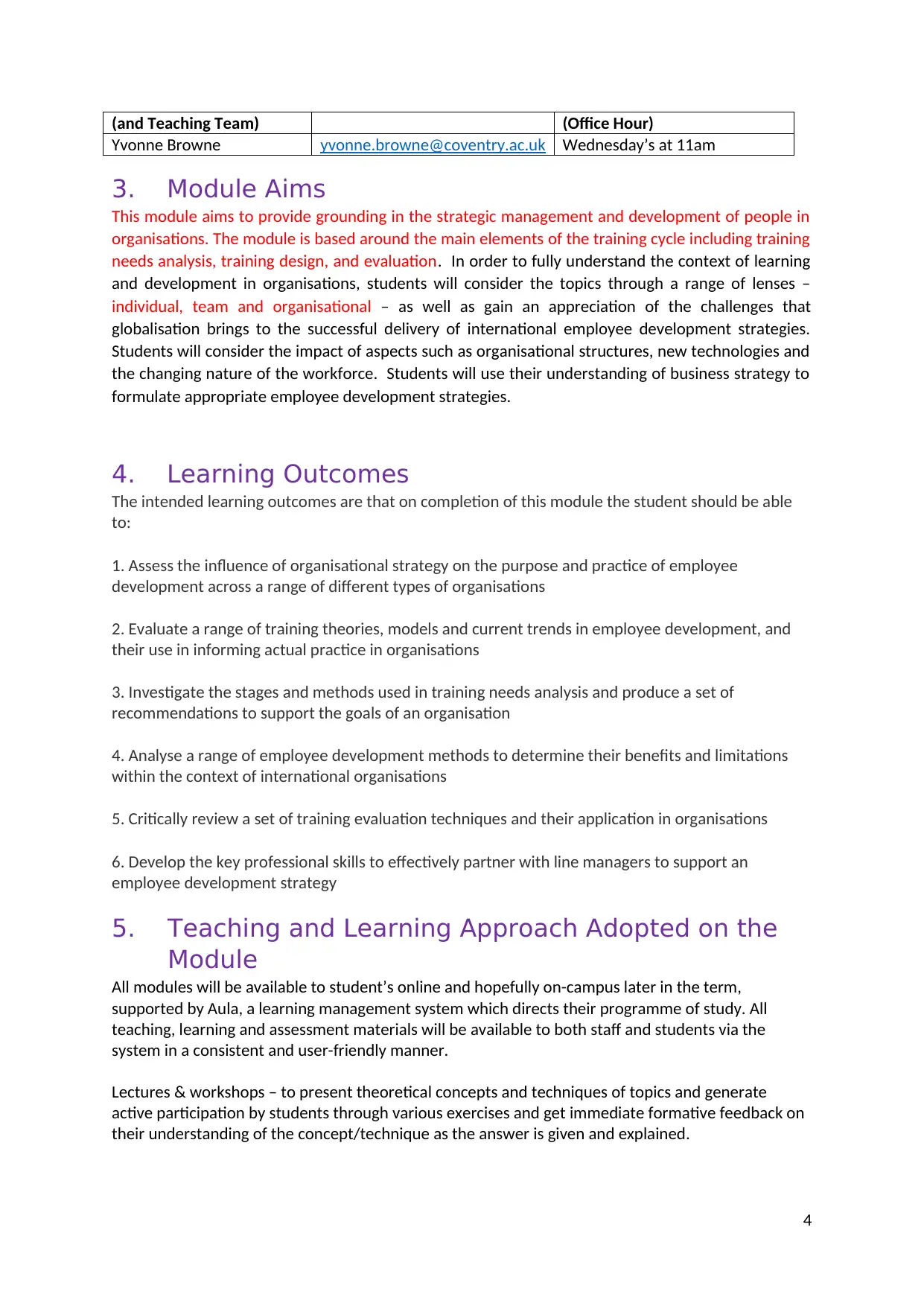
(and Teaching Team) (Office Hour)
Yvonne Browne yvonne.browne@coventry.ac.uk Wednesday’s at 11am
3. Module Aims
This module aims to provide grounding in the strategic management and development of people in
organisations. The module is based around the main elements of the training cycle including training
needs analysis, training design, and evaluation. In order to fully understand the context of learning
and development in organisations, students will consider the topics through a range of lenses –
individual, team and organisational – as well as gain an appreciation of the challenges that
globalisation brings to the successful delivery of international employee development strategies.
Students will consider the impact of aspects such as organisational structures, new technologies and
the changing nature of the workforce. Students will use their understanding of business strategy to
formulate appropriate employee development strategies.
4. Learning Outcomes
The intended learning outcomes are that on completion of this module the student should be able
to:
1. Assess the influence of organisational strategy on the purpose and practice of employee
development across a range of different types of organisations
2. Evaluate a range of training theories, models and current trends in employee development, and
their use in informing actual practice in organisations
3. Investigate the stages and methods used in training needs analysis and produce a set of
recommendations to support the goals of an organisation
4. Analyse a range of employee development methods to determine their benefits and limitations
within the context of international organisations
5. Critically review a set of training evaluation techniques and their application in organisations
6. Develop the key professional skills to effectively partner with line managers to support an
employee development strategy
5. Teaching and Learning Approach Adopted on the
Module
All modules will be available to student’s online and hopefully on-campus later in the term,
supported by Aula, a learning management system which directs their programme of study. All
teaching, learning and assessment materials will be available to both staff and students via the
system in a consistent and user-friendly manner.
Lectures & workshops – to present theoretical concepts and techniques of topics and generate
active participation by students through various exercises and get immediate formative feedback on
their understanding of the concept/technique as the answer is given and explained.
4
Yvonne Browne yvonne.browne@coventry.ac.uk Wednesday’s at 11am
3. Module Aims
This module aims to provide grounding in the strategic management and development of people in
organisations. The module is based around the main elements of the training cycle including training
needs analysis, training design, and evaluation. In order to fully understand the context of learning
and development in organisations, students will consider the topics through a range of lenses –
individual, team and organisational – as well as gain an appreciation of the challenges that
globalisation brings to the successful delivery of international employee development strategies.
Students will consider the impact of aspects such as organisational structures, new technologies and
the changing nature of the workforce. Students will use their understanding of business strategy to
formulate appropriate employee development strategies.
4. Learning Outcomes
The intended learning outcomes are that on completion of this module the student should be able
to:
1. Assess the influence of organisational strategy on the purpose and practice of employee
development across a range of different types of organisations
2. Evaluate a range of training theories, models and current trends in employee development, and
their use in informing actual practice in organisations
3. Investigate the stages and methods used in training needs analysis and produce a set of
recommendations to support the goals of an organisation
4. Analyse a range of employee development methods to determine their benefits and limitations
within the context of international organisations
5. Critically review a set of training evaluation techniques and their application in organisations
6. Develop the key professional skills to effectively partner with line managers to support an
employee development strategy
5. Teaching and Learning Approach Adopted on the
Module
All modules will be available to student’s online and hopefully on-campus later in the term,
supported by Aula, a learning management system which directs their programme of study. All
teaching, learning and assessment materials will be available to both staff and students via the
system in a consistent and user-friendly manner.
Lectures & workshops – to present theoretical concepts and techniques of topics and generate
active participation by students through various exercises and get immediate formative feedback on
their understanding of the concept/technique as the answer is given and explained.
4
Paraphrase This Document
Need a fresh take? Get an instant paraphrase of this document with our AI Paraphraser
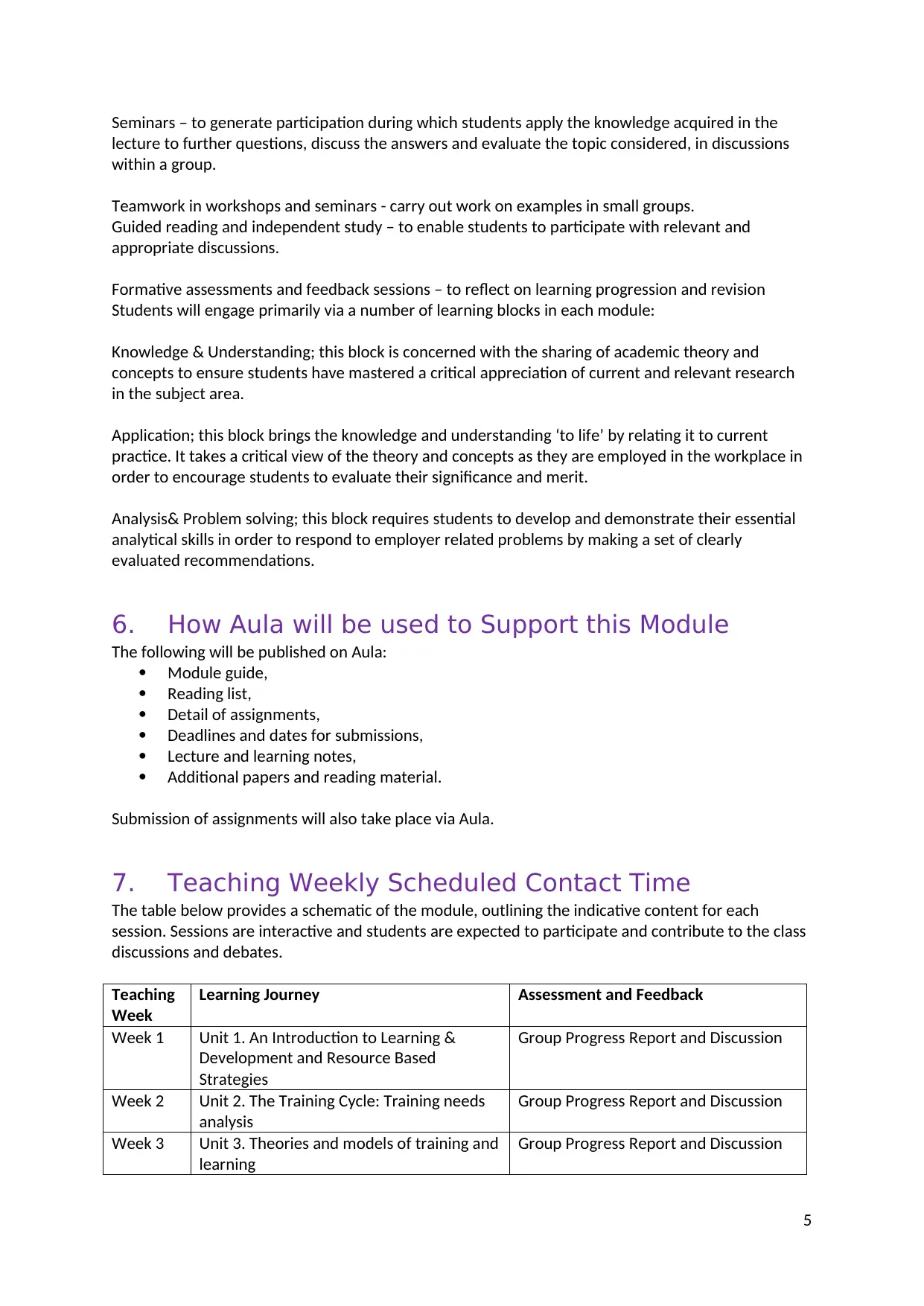
Seminars – to generate participation during which students apply the knowledge acquired in the
lecture to further questions, discuss the answers and evaluate the topic considered, in discussions
within a group.
Teamwork in workshops and seminars - carry out work on examples in small groups.
Guided reading and independent study – to enable students to participate with relevant and
appropriate discussions.
Formative assessments and feedback sessions – to reflect on learning progression and revision
Students will engage primarily via a number of learning blocks in each module:
Knowledge & Understanding; this block is concerned with the sharing of academic theory and
concepts to ensure students have mastered a critical appreciation of current and relevant research
in the subject area.
Application; this block brings the knowledge and understanding ‘to life’ by relating it to current
practice. It takes a critical view of the theory and concepts as they are employed in the workplace in
order to encourage students to evaluate their significance and merit.
Analysis& Problem solving; this block requires students to develop and demonstrate their essential
analytical skills in order to respond to employer related problems by making a set of clearly
evaluated recommendations.
6. How Aula will be used to Support this Module
The following will be published on Aula:
Module guide,
Reading list,
Detail of assignments,
Deadlines and dates for submissions,
Lecture and learning notes,
Additional papers and reading material.
Submission of assignments will also take place via Aula.
7. Teaching Weekly Scheduled Contact Time
The table below provides a schematic of the module, outlining the indicative content for each
session. Sessions are interactive and students are expected to participate and contribute to the class
discussions and debates.
Teaching
Week
Learning Journey Assessment and Feedback
Week 1 Unit 1. An Introduction to Learning &
Development and Resource Based
Strategies
Group Progress Report and Discussion
Week 2 Unit 2. The Training Cycle: Training needs
analysis
Group Progress Report and Discussion
Week 3 Unit 3. Theories and models of training and
learning
Group Progress Report and Discussion
5
lecture to further questions, discuss the answers and evaluate the topic considered, in discussions
within a group.
Teamwork in workshops and seminars - carry out work on examples in small groups.
Guided reading and independent study – to enable students to participate with relevant and
appropriate discussions.
Formative assessments and feedback sessions – to reflect on learning progression and revision
Students will engage primarily via a number of learning blocks in each module:
Knowledge & Understanding; this block is concerned with the sharing of academic theory and
concepts to ensure students have mastered a critical appreciation of current and relevant research
in the subject area.
Application; this block brings the knowledge and understanding ‘to life’ by relating it to current
practice. It takes a critical view of the theory and concepts as they are employed in the workplace in
order to encourage students to evaluate their significance and merit.
Analysis& Problem solving; this block requires students to develop and demonstrate their essential
analytical skills in order to respond to employer related problems by making a set of clearly
evaluated recommendations.
6. How Aula will be used to Support this Module
The following will be published on Aula:
Module guide,
Reading list,
Detail of assignments,
Deadlines and dates for submissions,
Lecture and learning notes,
Additional papers and reading material.
Submission of assignments will also take place via Aula.
7. Teaching Weekly Scheduled Contact Time
The table below provides a schematic of the module, outlining the indicative content for each
session. Sessions are interactive and students are expected to participate and contribute to the class
discussions and debates.
Teaching
Week
Learning Journey Assessment and Feedback
Week 1 Unit 1. An Introduction to Learning &
Development and Resource Based
Strategies
Group Progress Report and Discussion
Week 2 Unit 2. The Training Cycle: Training needs
analysis
Group Progress Report and Discussion
Week 3 Unit 3. Theories and models of training and
learning
Group Progress Report and Discussion
5
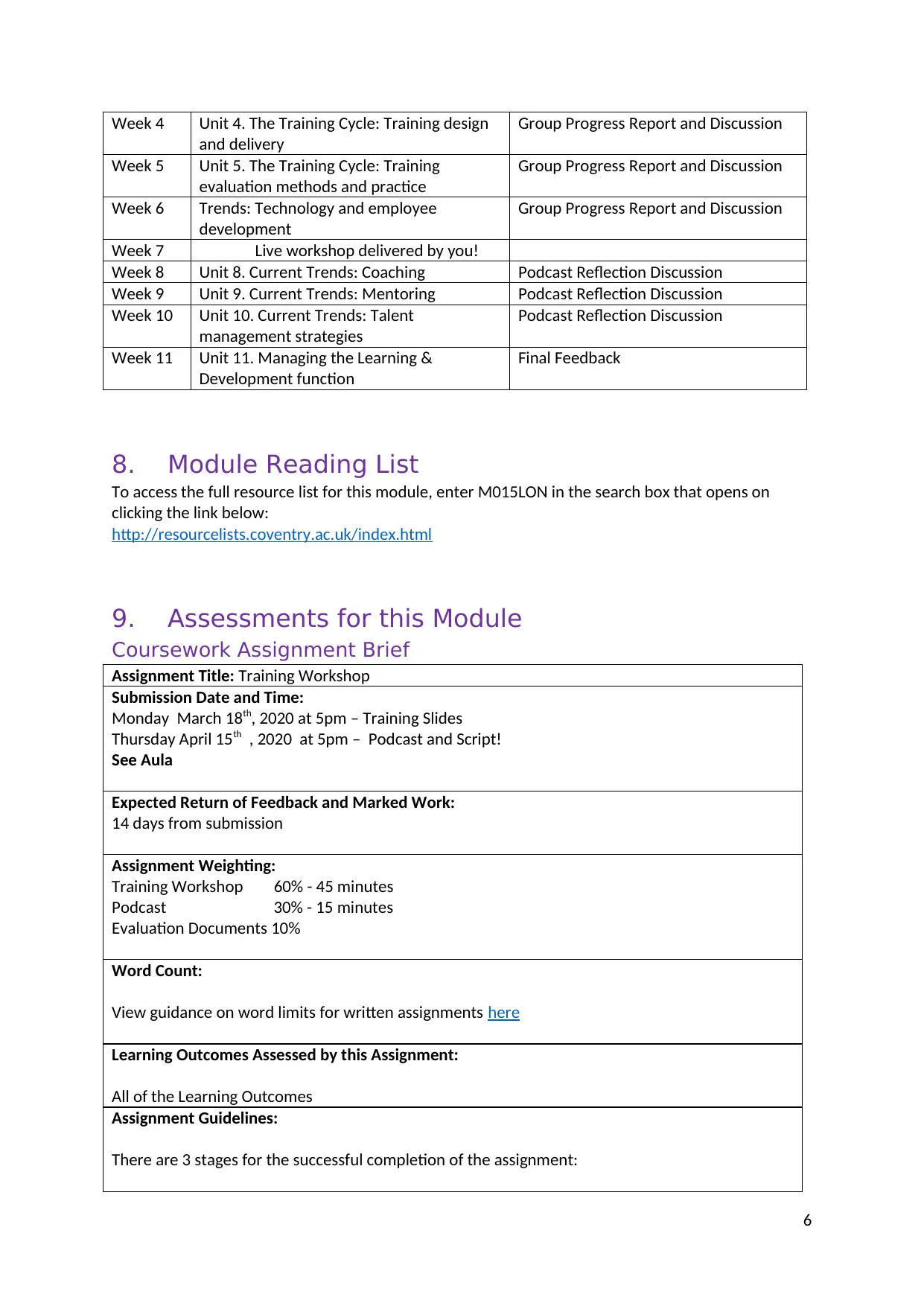
Week 4 Unit 4. The Training Cycle: Training design
and delivery
Group Progress Report and Discussion
Week 5 Unit 5. The Training Cycle: Training
evaluation methods and practice
Group Progress Report and Discussion
Week 6 Trends: Technology and employee
development
Group Progress Report and Discussion
Week 7 Live workshop delivered by you!
Week 8 Unit 8. Current Trends: Coaching Podcast Reflection Discussion
Week 9 Unit 9. Current Trends: Mentoring Podcast Reflection Discussion
Week 10 Unit 10. Current Trends: Talent
management strategies
Podcast Reflection Discussion
Week 11 Unit 11. Managing the Learning &
Development function
Final Feedback
8. Module Reading List
To access the full resource list for this module, enter M015LON in the search box that opens on
clicking the link below:
http://resourcelists.coventry.ac.uk/index.html
9. Assessments for this Module
Coursework Assignment Brief
Assignment Title: Training Workshop
Submission Date and Time:
Monday March 18th, 2020 at 5pm – Training Slides
Thursday April 15th , 2020 at 5pm – Podcast and Script!
See Aula
Expected Return of Feedback and Marked Work:
14 days from submission
Assignment Weighting:
Training Workshop 60% - 45 minutes
Podcast 30% - 15 minutes
Evaluation Documents 10%
Word Count:
View guidance on word limits for written assignments here
Learning Outcomes Assessed by this Assignment:
All of the Learning Outcomes
Assignment Guidelines:
There are 3 stages for the successful completion of the assignment:
6
and delivery
Group Progress Report and Discussion
Week 5 Unit 5. The Training Cycle: Training
evaluation methods and practice
Group Progress Report and Discussion
Week 6 Trends: Technology and employee
development
Group Progress Report and Discussion
Week 7 Live workshop delivered by you!
Week 8 Unit 8. Current Trends: Coaching Podcast Reflection Discussion
Week 9 Unit 9. Current Trends: Mentoring Podcast Reflection Discussion
Week 10 Unit 10. Current Trends: Talent
management strategies
Podcast Reflection Discussion
Week 11 Unit 11. Managing the Learning &
Development function
Final Feedback
8. Module Reading List
To access the full resource list for this module, enter M015LON in the search box that opens on
clicking the link below:
http://resourcelists.coventry.ac.uk/index.html
9. Assessments for this Module
Coursework Assignment Brief
Assignment Title: Training Workshop
Submission Date and Time:
Monday March 18th, 2020 at 5pm – Training Slides
Thursday April 15th , 2020 at 5pm – Podcast and Script!
See Aula
Expected Return of Feedback and Marked Work:
14 days from submission
Assignment Weighting:
Training Workshop 60% - 45 minutes
Podcast 30% - 15 minutes
Evaluation Documents 10%
Word Count:
View guidance on word limits for written assignments here
Learning Outcomes Assessed by this Assignment:
All of the Learning Outcomes
Assignment Guidelines:
There are 3 stages for the successful completion of the assignment:
6
⊘ This is a preview!⊘
Do you want full access?
Subscribe today to unlock all pages.

Trusted by 1+ million students worldwide
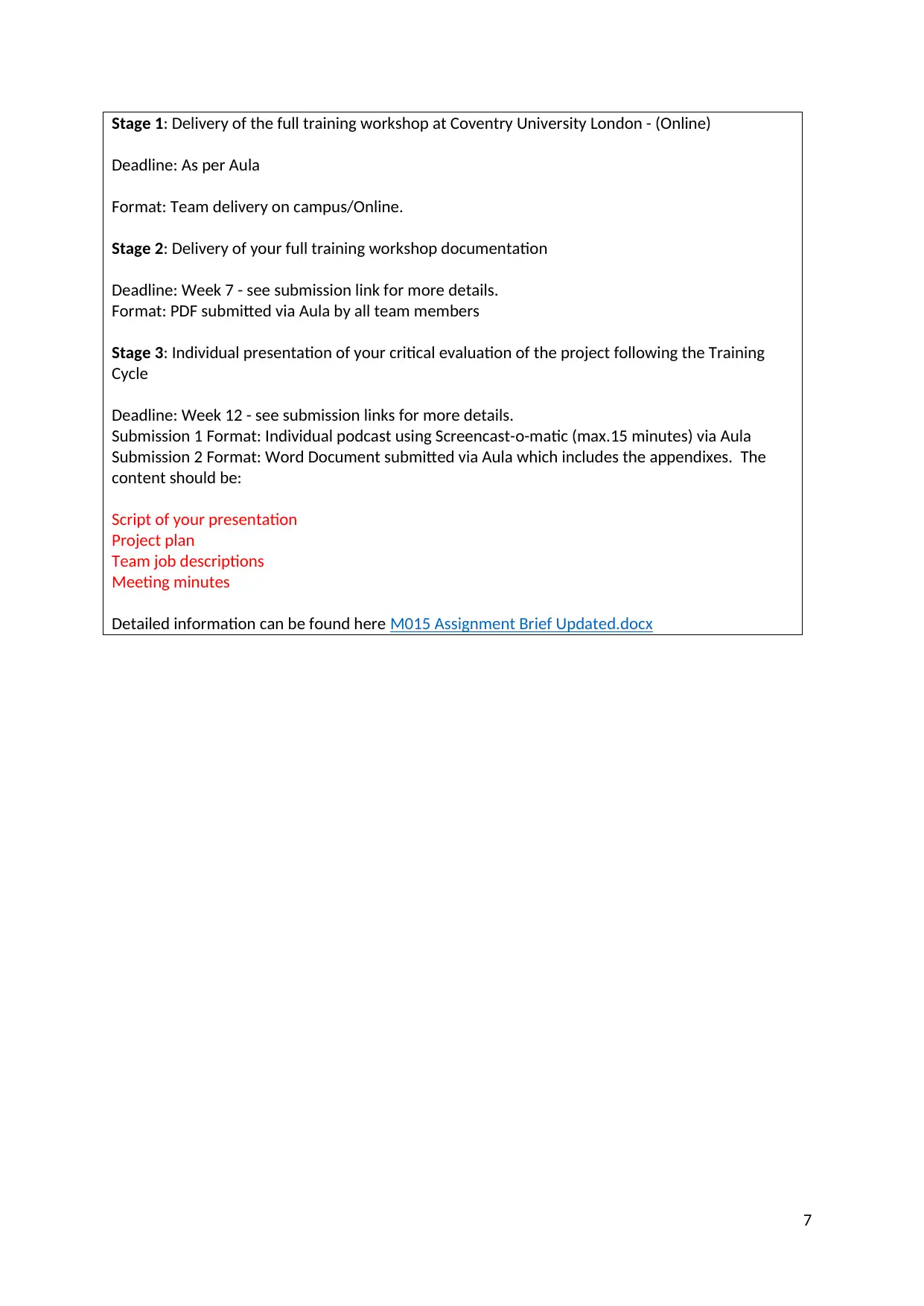
Stage 1: Delivery of the full training workshop at Coventry University London - (Online)
Deadline: As per Aula
Format: Team delivery on campus/Online.
Stage 2: Delivery of your full training workshop documentation
Deadline: Week 7 - see submission link for more details.
Format: PDF submitted via Aula by all team members
Stage 3: Individual presentation of your critical evaluation of the project following the Training
Cycle
Deadline: Week 12 - see submission links for more details.
Submission 1 Format: Individual podcast using Screencast-o-matic (max.15 minutes) via Aula
Submission 2 Format: Word Document submitted via Aula which includes the appendixes. The
content should be:
Script of your presentation
Project plan
Team job descriptions
Meeting minutes
Detailed information can be found here M015 Assignment Brief Updated.docx
7
Deadline: As per Aula
Format: Team delivery on campus/Online.
Stage 2: Delivery of your full training workshop documentation
Deadline: Week 7 - see submission link for more details.
Format: PDF submitted via Aula by all team members
Stage 3: Individual presentation of your critical evaluation of the project following the Training
Cycle
Deadline: Week 12 - see submission links for more details.
Submission 1 Format: Individual podcast using Screencast-o-matic (max.15 minutes) via Aula
Submission 2 Format: Word Document submitted via Aula which includes the appendixes. The
content should be:
Script of your presentation
Project plan
Team job descriptions
Meeting minutes
Detailed information can be found here M015 Assignment Brief Updated.docx
7
Paraphrase This Document
Need a fresh take? Get an instant paraphrase of this document with our AI Paraphraser
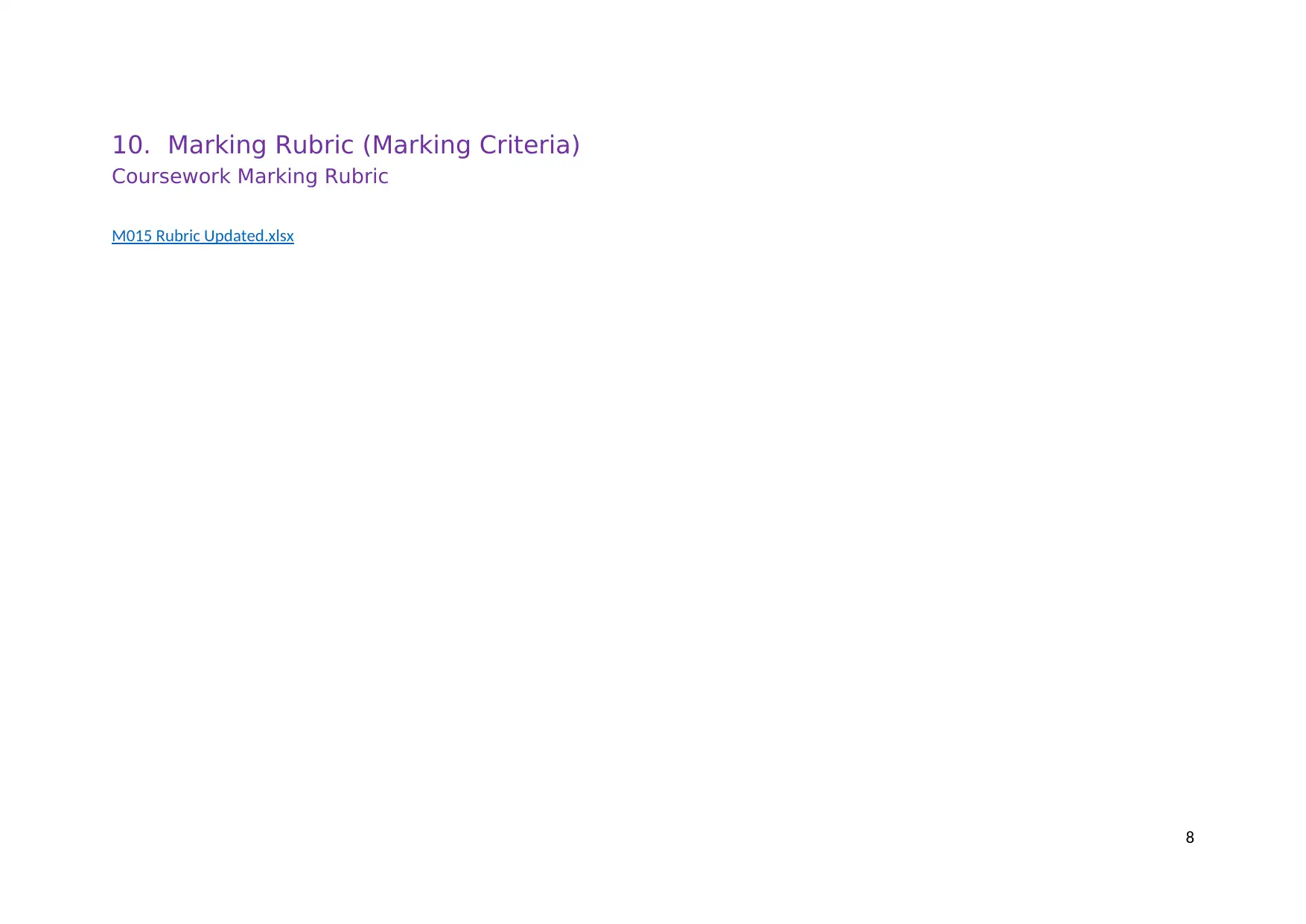
10. Marking Rubric (Marking Criteria)
Coursework Marking Rubric
M015 Rubric Updated.xlsx
8
Coursework Marking Rubric
M015 Rubric Updated.xlsx
8
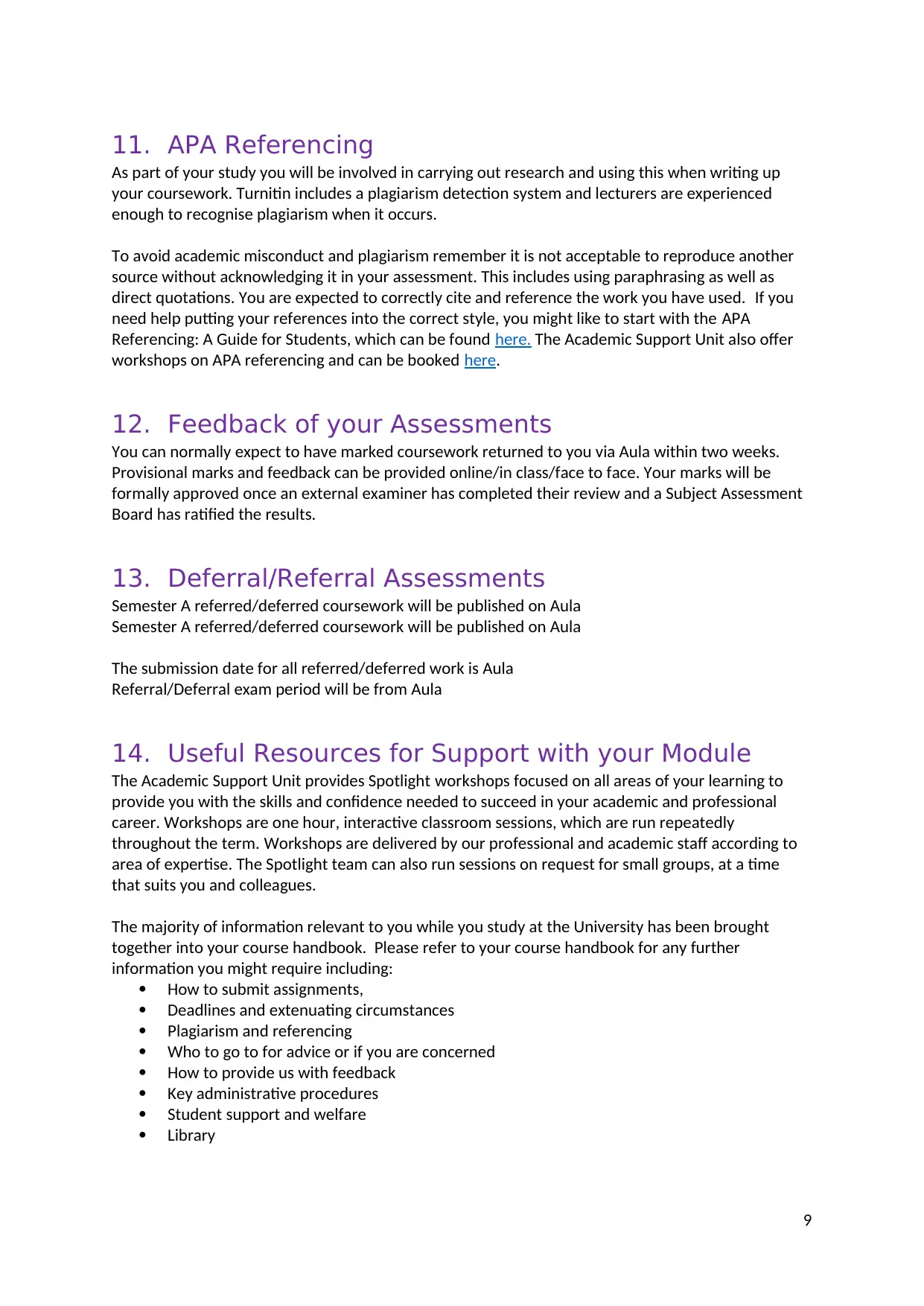
11. APA Referencing
As part of your study you will be involved in carrying out research and using this when writing up
your coursework. Turnitin includes a plagiarism detection system and lecturers are experienced
enough to recognise plagiarism when it occurs.
To avoid academic misconduct and plagiarism remember it is not acceptable to reproduce another
source without acknowledging it in your assessment. This includes using paraphrasing as well as
direct quotations. You are expected to correctly cite and reference the work you have used. If you
need help putting your references into the correct style, you might like to start with the APA
Referencing: A Guide for Students, which can be found here. The Academic Support Unit also offer
workshops on APA referencing and can be booked here.
12. Feedback of your Assessments
You can normally expect to have marked coursework returned to you via Aula within two weeks.
Provisional marks and feedback can be provided online/in class/face to face. Your marks will be
formally approved once an external examiner has completed their review and a Subject Assessment
Board has ratified the results.
13. Deferral/Referral Assessments
Semester A referred/deferred coursework will be published on Aula
Semester A referred/deferred coursework will be published on Aula
The submission date for all referred/deferred work is Aula
Referral/Deferral exam period will be from Aula
14. Useful Resources for Support with your Module
The Academic Support Unit provides Spotlight workshops focused on all areas of your learning to
provide you with the skills and confidence needed to succeed in your academic and professional
career. Workshops are one hour, interactive classroom sessions, which are run repeatedly
throughout the term. Workshops are delivered by our professional and academic staff according to
area of expertise. The Spotlight team can also run sessions on request for small groups, at a time
that suits you and colleagues.
The majority of information relevant to you while you study at the University has been brought
together into your course handbook. Please refer to your course handbook for any further
information you might require including:
How to submit assignments,
Deadlines and extenuating circumstances
Plagiarism and referencing
Who to go to for advice or if you are concerned
How to provide us with feedback
Key administrative procedures
Student support and welfare
Library
9
As part of your study you will be involved in carrying out research and using this when writing up
your coursework. Turnitin includes a plagiarism detection system and lecturers are experienced
enough to recognise plagiarism when it occurs.
To avoid academic misconduct and plagiarism remember it is not acceptable to reproduce another
source without acknowledging it in your assessment. This includes using paraphrasing as well as
direct quotations. You are expected to correctly cite and reference the work you have used. If you
need help putting your references into the correct style, you might like to start with the APA
Referencing: A Guide for Students, which can be found here. The Academic Support Unit also offer
workshops on APA referencing and can be booked here.
12. Feedback of your Assessments
You can normally expect to have marked coursework returned to you via Aula within two weeks.
Provisional marks and feedback can be provided online/in class/face to face. Your marks will be
formally approved once an external examiner has completed their review and a Subject Assessment
Board has ratified the results.
13. Deferral/Referral Assessments
Semester A referred/deferred coursework will be published on Aula
Semester A referred/deferred coursework will be published on Aula
The submission date for all referred/deferred work is Aula
Referral/Deferral exam period will be from Aula
14. Useful Resources for Support with your Module
The Academic Support Unit provides Spotlight workshops focused on all areas of your learning to
provide you with the skills and confidence needed to succeed in your academic and professional
career. Workshops are one hour, interactive classroom sessions, which are run repeatedly
throughout the term. Workshops are delivered by our professional and academic staff according to
area of expertise. The Spotlight team can also run sessions on request for small groups, at a time
that suits you and colleagues.
The majority of information relevant to you while you study at the University has been brought
together into your course handbook. Please refer to your course handbook for any further
information you might require including:
How to submit assignments,
Deadlines and extenuating circumstances
Plagiarism and referencing
Who to go to for advice or if you are concerned
How to provide us with feedback
Key administrative procedures
Student support and welfare
Library
9
⊘ This is a preview!⊘
Do you want full access?
Subscribe today to unlock all pages.

Trusted by 1+ million students worldwide
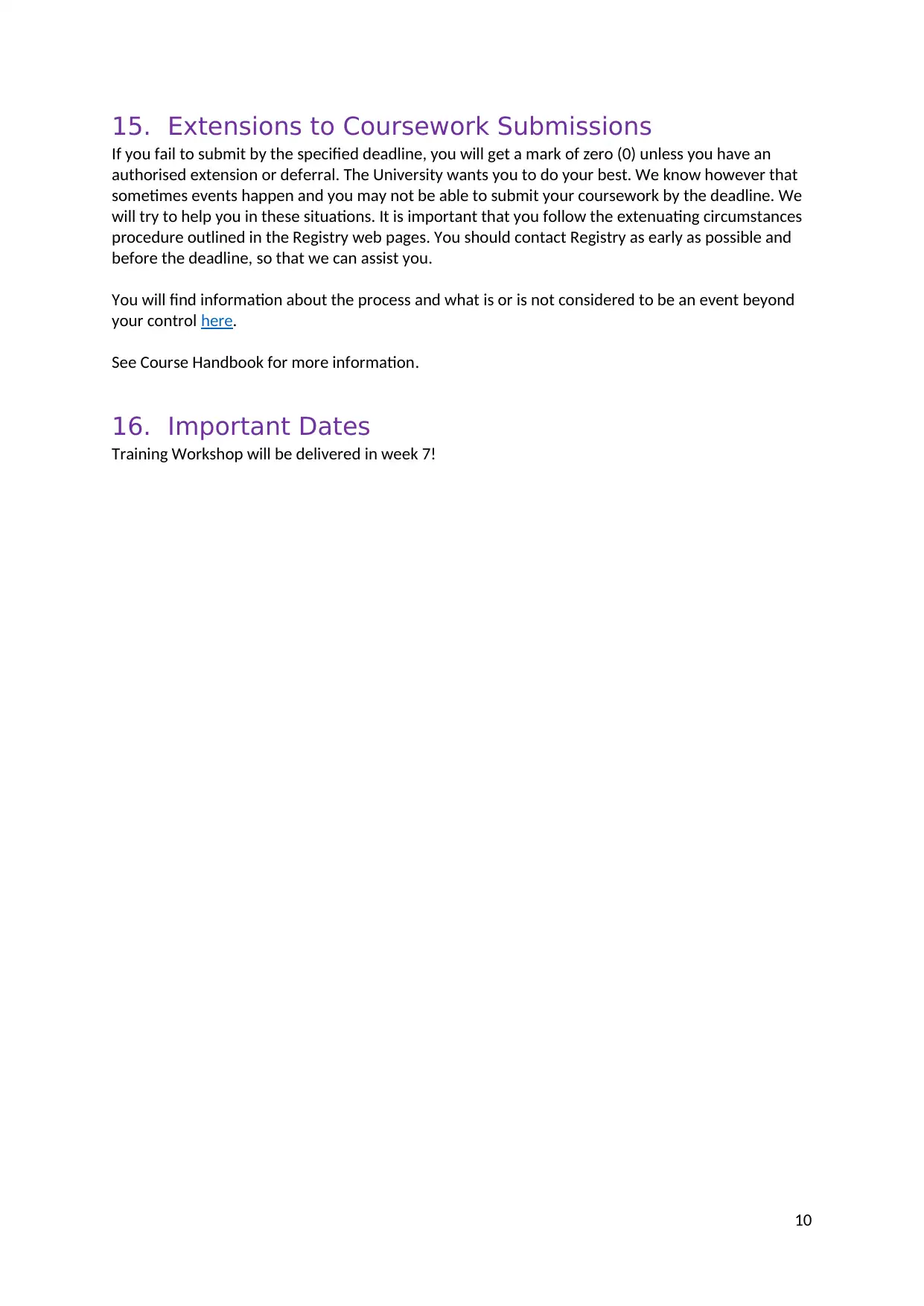
15. Extensions to Coursework Submissions
If you fail to submit by the specified deadline, you will get a mark of zero (0) unless you have an
authorised extension or deferral. The University wants you to do your best. We know however that
sometimes events happen and you may not be able to submit your coursework by the deadline. We
will try to help you in these situations. It is important that you follow the extenuating circumstances
procedure outlined in the Registry web pages. You should contact Registry as early as possible and
before the deadline, so that we can assist you.
You will find information about the process and what is or is not considered to be an event beyond
your control here.
See Course Handbook for more information.
16. Important Dates
Training Workshop will be delivered in week 7!
10
If you fail to submit by the specified deadline, you will get a mark of zero (0) unless you have an
authorised extension or deferral. The University wants you to do your best. We know however that
sometimes events happen and you may not be able to submit your coursework by the deadline. We
will try to help you in these situations. It is important that you follow the extenuating circumstances
procedure outlined in the Registry web pages. You should contact Registry as early as possible and
before the deadline, so that we can assist you.
You will find information about the process and what is or is not considered to be an event beyond
your control here.
See Course Handbook for more information.
16. Important Dates
Training Workshop will be delivered in week 7!
10
1 out of 10
Related Documents
Your All-in-One AI-Powered Toolkit for Academic Success.
+13062052269
info@desklib.com
Available 24*7 on WhatsApp / Email
![[object Object]](/_next/static/media/star-bottom.7253800d.svg)
Unlock your academic potential
Copyright © 2020–2026 A2Z Services. All Rights Reserved. Developed and managed by ZUCOL.





